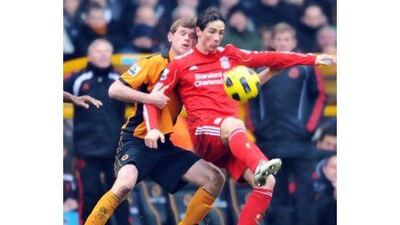WOLVERHAMPTON // As a player, Kenny Dalglish had a symbiotic relationship with Liverpool's No 9. As a manager, there are signs that is being replicated.
In the days before assists became part of the sport's statistics, it is hard to ascertain precisely how many of Ian Rush's 346 goals were set up by the Scot, but it is altogether easier to determine that three league games in charge have brought three goals for Fernando Torres.
So sullen until recently, his brace helped Dalglish to the first win of his second spell in charge. As significant, though, has been the galvanising effect he has had on Raul Meireles's Liverpool career.
A man with a reputation as a deadly shot from long range had, until recently, the dubious distinction of having more efforts on goal without success than any other Premier League player.
Fortunes can change swiftly, however, and Meireles now has two goals in as many games. Both have been stunning.
He symbolises the transformation in Liverpool. So, indeed, did this result. Wolverhampton Wanderers ushered Roy Hodgson towards the exit by winning at Anfield last month. Now the change at the helm has brought a change in fortunes.
Under other circumstances, winning at Wolves would not be especially notable. For a team who completed 2010 with a mere two triumphs on their travels in the Premier League (at Burnley and Bolton), it had a significance.
Liverpool arrived at Molineux with an away record that bettered only Wolves'. They departed with the points and renewed optimism from a display of unusual creativity.
Meireles was instrumental. Scorer spectacularly, he was a creator consistently. There are signs that he is developing an understanding with Torres which, if not as established as Steven Gerrard's, offers Liverpool a much-needed alternative.
"Raul has been really impressive," said Dalglish. "I thought Fernando was fantastic. It's the best since I've come in. It wasn't just his goals; it was the work-rate he put in. That performance will do for us every day of the week."
Virtually every opportunity involved one or both of the two most gifted players on display. The first came from Meireles's fine pass.
Torres glided past Christophe Berra before drawing a save from Wayne Hennessey. Torres turned supplier then as Meireles's well-struck half-volley went just wide and Maxi Rodriguez shot straight at Hennessey.
The unexpected element about the breakthrough was that it followed a rare instance of a forward pass by Christian Poulsen. It proved perceptive, too, enabling Meireles to spring the offside trap and square the ball for Torres to sweep it into the unguarded net. He had a similarly simple finish in injury time, Dirk Kuyt's break clear allowing the Spaniard to finish.
His strikes sandwiched the pick of the goals. Seconds after Hennessey denied Kuyt, Meireles provided it. Berra's headed clearance fell invitingly and a sweetly struck volley gave the goalkeeper no chance.
"A wonder strike that nobody's stopping," said Mick McCarthy, the Wolves manager. "You could put two goalkeepers in there and nobody's stopping it."
Thereafter, the substitute Jonjo Shelvey blazed wide with his first touch when he could have scored; Meireles, inevitably, was the provider.
Liverpool, meanwhile, mustered a first league clean sheet in seven weeks. It was comparatively untroubled although Pepe Reina made a point-blank block from Nenad Milijas on the stroke of half time and later repelled a swerving shot from Steven Fletcher. Wolves had pressure, but not clear-cut chances.
"I've loads of complaints," McCarthy added. "We let them off the hook by trying to play offside after 30-odd minutes. We didn't have the quality today with the final shot, or the pass, or the finish."
The consequence was that, for the first time since Everton were overcome 3-1 in February 1991, Dalglish was a winning Liverpool manager.
A striker scored twice and a midfielder once that day, too - David Speedie and Jan Molby respectively - but when Torres is at his prime, the comparisons are not with the stocky, short-tempered Speedie.


